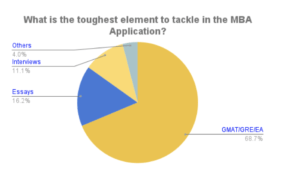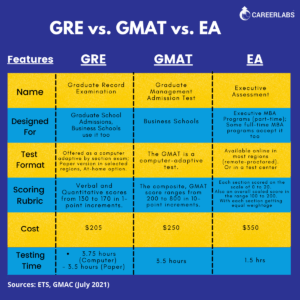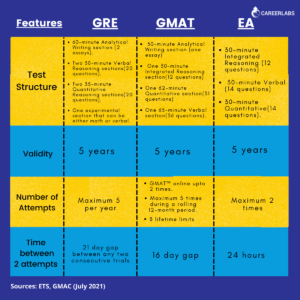At CareerLabs, in our experience with 1000s of GMAT & GRE candidates and MBA applicants, the main reason most quit their MBA plans are due to the dreaded B-School admissions tests!
So it came as no surprise, that even in the poll for Day 7 of the 21-day MBA Plan, the tests topped the list of hurdles!

What makes the MBA Admissions tests so difficult?
If you ask a marathon runner about the hardest part of the marathon, you may think that is “hitting the wall”! But the truth is that the hardest part for many is training for the marathon. It is so so true for tests too.
What applicants don’t understand is that applying to an MBA requires one to set some dedicated time aside for it. You have to make space for MBA in your life!
One way to fall into this habit will be to start by preparing for the admissions test like the GMAT/GRE/ EA (think 1-2 hours of studying per day with extended hours over weekend for about 2-3 months). Later, this time could be used for either improving one’s analytical skills by taking additional certifications or other leadership initiatives or prepping for the essays.
Anyways, making time for the tests and getting into the “test taker” mode is what you need to do. Remember slogging it out for your college entrance tests? Back to being a student. Typical preparation time for these tests might be anywhere between 90- 150 hours.
Consider the test as a project, plan for it, track progress on it and take it as soon as possible. In fact, the moment you decide to do an MBA, it is better to start planning for these tests.
GMAT vs GRE vs EA- A Quick Look


Which one to choose? Many may say that one test might be easier than the others. I say, pick your poison! You do you, always!
13 questions to help you decide between GMAT, GRE and EA
- What is the preferred test for your targeted program? Like GMAT being a preferred test for management education. Check it first. MEM programs do not accept GMAT. Many B-School and Graduate School programs went test-optional or waived off the tests completely this past year. EA was recently accepted by a few schools even for their full-time MBA program.
- If there are more tests being accepted, does one offer a higher validity over the others? This might be a good question to ask if you are unsure about when you want to start your program. But GMAT and GRE Test scores last for long- 5 years!
- How often can you take these tests? This might be a concern if you are not confident about your preparation and especially if you definitely want to get into B-School at any costs and have limited time.
- What is the mode of delivery of these tests? A paper-based test, computer-based test or a test that can be taken at home? Policies keep changing around these.
- What does the test cover? Most of these will have a quantitative section, verbal section and a writing assessment. Of course, depending on the tests, the focus and emphasis on each of these sections change. How they get computed in the overall score also is different.
- Does it matter to you that you have the ability to skip questions?
- For each of these tests, questions will change based on your answers for the previous tests. GMAT, GRE and EA have different ways of adapting. Will this be a factor?
- How strong is your vocabulary? How comfortable are you learning this? GRE emphasises more on vocabulary whereas GMAT is about critical reasoning and reading comprehension skills. GMAT does lay more emphasis on grammar.
- Are you used to using a calculator for your tests? GRE allows it while GMAT doesn’t.
- How comfortable are you with the GMAT’s Integrated Reasoning section? It is specifically designed for B-Schools and is an unique feature that tests for real world problem-solving skills. It is not computer-adaptive and is reported separately.
- What are your strong points- quantitative or verbal section? For which section will you need more preparation?
- How much time would you have to work on preparing for these tests? Depending on what you are good at, you may want to consider one over the other.
- Are you likely to change your mind about the program? For example, you are deciding between MS in Computer Science and an MIM program. Or weighing pros and cons for MBA vs MEM. In this case, as GRE is accepted by both Graduate Schools & Business Schools, it might be a safer option.
Oh, did you change your mind now? Go back to Question 1!
What if I don’t get my targeted score?
At the end of the day, it is an one-time test and your performance on it is not everything.
There are programs and other MBA alternatives that do not need ANY tests.
Many programs that have gone test-optional this past year and some dis away with them altogether.
There are programs that offer their own (easier to tackle) tests. Like IE Global Admissions Test or the Warwick test.
So there is always a way out!
What now?
I recommend that you take a diagnostic test (of your favourite test) to understand where you stand. Then start the preparation.
P.S.
One thing though. After days of slogging away at a test while balancing the rest of your life, when you get that 760 on the GMAT or the 330 on the GRE, you are sure to feel top of the world. Happy studying!









